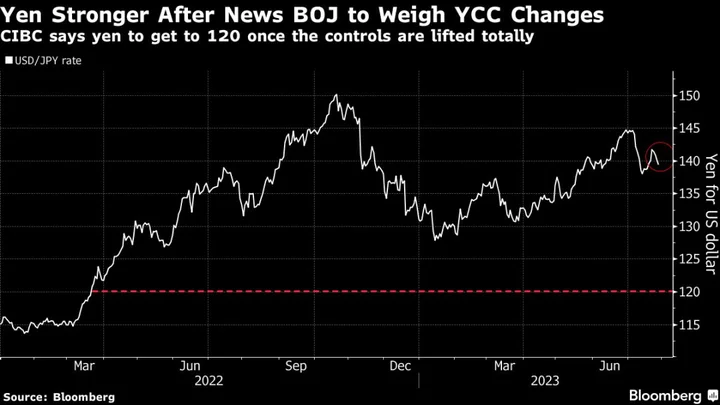Bonds around the world retreated after the Bank of Japan, so far a holdout on ultra-loose monetary policy, widened its yield curve tolerance band.
The move sent Japan’s 10-year yield to a nine-year high, and triggered big swings in the yen as investors debated the implications of the BOJ’s decision.
Treasury 10-year yields were flat at 4%, having risen 13 basis points the previous day. In Europe, German and French yields rose, while yields on 10-year debt in Australia climbed as much as 20 basis points.
Globally, BOJ moves toward normalization could significantly impact investment flows, given Japanese investors are the biggest foreign holders of US government debt, and also own sizable amounts of European and Australian bonds, among other assets. Higher yields in Japan could spur many funds to repatriate cash home.
“Doing away with the rigid yield limits opens the space for more policy adjustments in the coming months,” said Eugenia Victorino, head of Asia strategy at Skandinaviska Enskilda Banken. “That would allow the yen to appreciate considering that the Fed is now near the end of its own tightening cycle,” she added.
US shares took a knock towards close on Thursday when the Nikkei news agency reported the BOJ would discuss tweaks to yield-curve control at its meeting. The bank followed through at its Friday meeting, saying it would show more flexibility over its yield curve control policy. That lifted the yen as much as 1% against the dollar and the 10-year yield jumped 13 basis points, cracking past the previous 0.5% limit. Japanese equities slid, with the exception of banks which stand to benefit from higher borrowing costs.
The yen ceded some of its gains as the session wore on, but is headed for its best month since March, with gains so far of almost 3.5%. The dollar index traded flat and is set for a second week of gains.
“The BOJ decision is an invitation to short dollar-yen,” said Kenneth Broux, currency strategist at Societe Generale SA. “Higher Japanese yields reduce the spread versus US Treasuries and German bunds.” He added however that dollar downside could be limited, given Thursday’s strong US data that could imply further Fed tightening.
More Comments on BOJ Move
Tony Sycamore, a market analyst at IG Australia Pty:
“This will likely see the market test the 1% cap in sessions ahead (like a red rag to a bull) and is significant because it marks the end to the BOJ’s multi-decade experiment of ultra loose monetary policy. Once the BOJ steps foot out the door, they can control the pace of the exit but they can’t change direction.”
Khoon Goh, head of Asia research at Australia & New Zealand Banking Group:
“The BOJ’s decision to tweak their yield curve control was broadly in line with what the market had anticipated, but probably not as hawkish as previously feared. The range that the 10-year JGB yield is allowed to fluctuate remains unchanged, but greater flexibility has been introduced at the upper and lower bounds of the range. But how far yields will be allowed to trade beyond those limits is uncertain, and something which the market will no doubt try to test.”
Joey Chew, head of Asia FX research at HSBC:
“We doubt this will be the end of high USD-JPY volatility in the near term. The disappointing lack of revision to its inflation forecasts for FY2024 and FY2025 suggests that the BOJ is still not convinced that inflation can stay above 2%.”
Matthew Simpson, a senior market analyst at City Index:
“If the BOJ wanted to confuse the markets, it’s mission accomplished. It’s seems apparent that we’re an important step closer to the BOJ actually widening or even abandoning YCC. Once the dust has settled, the focus shifts to PCE inflation report. Jerome Powell emphasized the importance of incoming inflation data, and if core PCE softens as expected the we’ll likely be looking for USD/JPY to close below 137 for the week.
Key events this week:
- Eurozone economic confidence, consumer confidence, Friday
- US consumer income, employment cost index, University of Michigan consumer sentiment, Friday
Some of the main moves in markets:
Stocks
- The Stoxx Europe 600 fell 0.2% as of 8:26 a.m. London time
- S&P 500 futures rose 0.5%
- Nasdaq 100 futures rose 0.8%
- Futures on the Dow Jones Industrial Average rose 0.3%
- The MSCI Asia Pacific Index rose 0.4%
- The MSCI Emerging Markets Index rose 0.4%
Currencies
- The Bloomberg Dollar Spot Index was little changed
- The euro fell 0.2% to $1.0961
- The Japanese yen was little changed at 139.41 per dollar
- The offshore yuan rose 0.2% to 7.1583 per dollar
- The British pound was little changed at $1.2788
Cryptocurrencies
- Bitcoin rose 0.1% to $29,179.59
- Ether rose 0.2% to $1,862.07
Bonds
- The yield on 10-year Treasuries was little changed at 4.00%
- Germany’s 10-year yield advanced five basis points to 2.53%
- Britain’s 10-year yield advanced five basis points to 4.36%
Commodities
- Brent crude was little changed
- Spot gold rose 0.2% to $1,950.86 an ounce
This story was produced with the assistance of Bloomberg Automation.
--With assistance from Rob Verdonck, Nurin Sofia, Iris Ouyang and Tassia Sipahutar.

